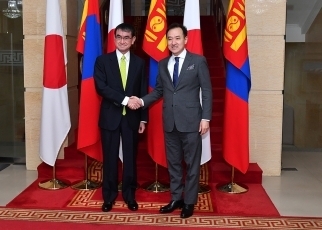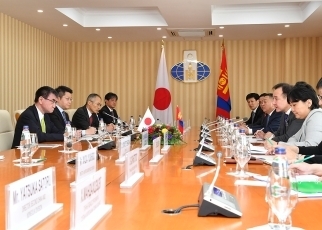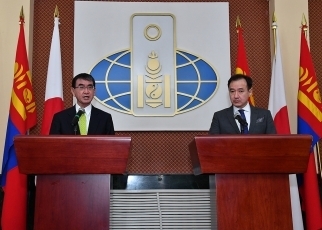Japan-Mongolia Relations
Japan-Mongolia Foreign Ministers’ Meeting
June 16, 2019



1 Opening
- Minister Kono expressed his delight at being the first Japanese Foreign Minister in nine years to visit Mongolia and welcomed this third meeting with Minister Tsogtbaatar. Furthermore, he explained that Japan has consistently placed importance on its relationship with Mongolia as a strategic partner with which Japan shares universal values, such as freedom, democracy, human rights, and the rule of law, and that Japan hopes further to develop the relationship. In addition, Minister Kono expressed his gratitude towards the many people of Mongolia who celebrated the new Japanese era “Reiwa,” including former Presidents and Prime Ministers, and for the continued warm support from Mongolia when natural disasters occur in Japan.
- In response, Minister Tsogtbaatar expressed his deep appreciation for Japan’s consistent support for the development of Mongolia since the democratization of 1990, and stated that Mongolia would like to further strengthen the “Strategic Partnership” with Japan, which shares universal values with Mongolia, and continue to develop bilateral relations in various fields.
2 Bilateral Relations
Prime Minister Abe and Prime Minister Khurelsukh agreed to promote concrete cooperation to realize a “free and open Indo-Pacific,” at the Japan-Mongolia Summit Meeting held during Prime Minister Khurelsukh’s visit to Japan last December. Based on this, during this Foreign Ministers’ Meeting, Minister Kono and Minister Tsogtbaatar agreed to strengthen initiatives in the following areas:
- The New Ulaanbaatar International Airport is a project that will not only promote regional aviation connectivity, but also greatly contribute to the Mongolian economy, and thus Japan and Mongolia will work towards the early opening of the airport, through both public and private cooperation.
- Japan has provided continued support for capacity building for the Mongolian army since 2012, and will continue to do so in cooperation with other countries.
- In addition, through participation of the Japan Ground Self-Defense Force in the US-Mongolia multinational training exercise “Khaan Quest” which is held annually in Mongolia, the two countries will deepen their cooperation in the area of security.
3 Expansion of People-to-People Exchanges
The two ministers welcomed the recent signing of the Memorandum of Cooperation between Japan and Mongolia which will facilitate smooth cooperation between the two countries when making use of the new status of residence of “Specified Skilled Worker” in Japan. In addition, the two ministers agreed to further expand people-to-people exchanges between the two countries, through the 2020 Tokyo Olympics and Paralympic Games, including using the “host town” system being implemented by local governments.
4 Development Assistance
The two ministers welcomed the exchange of notes on June 11 for grant aid of up to a total of 390 million yen for “The Project for Human Resource Development Scholarship,” a project to support young Mongolian government officials to study in Japan, and confirmed their continued cooperation in the development of human resources in Mongolia.
In addition, the two ministers welcomed the opening ceremony of the Japan-Mongolia Teaching Hospital, the first university hospital in Mongolia, to be held in the afternoon of June 16, and confirmed that the two countries will continue to cooperate in improving the medical environment of Mongolia.
In addition, the two ministers welcomed the opening ceremony of the Japan-Mongolia Teaching Hospital, the first university hospital in Mongolia, to be held in the afternoon of June 16, and confirmed that the two countries will continue to cooperate in improving the medical environment of Mongolia.
5 Regional and International Affairs
The two ministers exchanged views on regional and international affairs, including the North Korean issue, and agreed to further deepen cooperation. In particular, with regard to the issue of North Korea, the two ministers agreed on the importance of the full implementation of the United Nations Security Council (UNSC) resolutions towards the denuclearization of North Korea. In addition, the two ministers also confirmed that they will continue to work closely towards the early resolution of the abductions issue.

